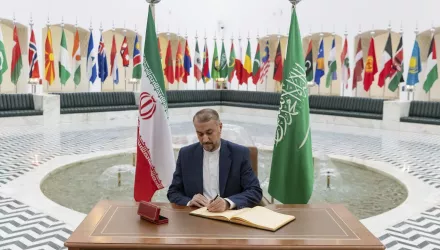On Tuesday morning after the historic agreement between Iran and world powers over Iran’s nuclear program, President Barack Obama and Iranian Foreign Minister Javad Zarif both mentioned a new factor at play for their two countries. Obama called for seizing the opportunity to move in a new direction, and Zarif spoke of a new chapter of hope. This is precisely what we can expect if the agreement slowly leads to normal political relations and even an entente between the U.S. and Iran.
The agreement marks a moment of success for the affirmation of steady diplomacy, the international rule of law, mutual respect, simultaneous political concessions and the shunning of hysteria from regional parties. A new era is possible, and we should hope that the U.S. and Iran pursue this process for further gains that can serve all the people of the region and the rest of the world. The alternative, in retrospect, was stupid to the point of criminality.
No two other states feed regional discord — or can promote regional calm — more than the U.S. and Iran, because of their wide networks of strategic, military and economic relations with parties across the region. The direct enmity and occasional confrontations between them feed a wide regional web of ideological battles in which Iran and its Arab allies, such as Hezbollah and Syria, routinely face off against Arab groups or governments that are supported, armed and funded by the United States, Israel or Saudi Arabia. Consequently, we suffer increasingly violent and occasionally barbaric Sunni-Shia, Iranian-Arab, Israeli-Islamist and revolutionary-royalist existential battles that have created openings for murderous movements such as Al-Qaeda and the Islamic State in Iraq and the Levant (ISIL) to take root and grow.
U.S.- and Iranian-backed political actors have steadily ratcheted up their aggressive rhetoric and occasional military clashes over the past two decades, to the point last year that many feared an Armageddon-like regional conflagration. A worst case scenario envisaged Israel or the U.S., perhaps with Saudi backing and facilities, making good on repeated threats and attacking Iran. This could have triggered a serious Iranian response in the region or abroad, another Hezbollah-Israel war and other possible outbreaks of violent confrontations across the region.
The breakthrough on Iran’s nuclear sector and ending international sanctions is important for many reasons, but four in particular deserve appreciation.
1. Iran’s internal development
The first consequences of this agreement should be felt in Iran, as confidence in its post-sanctions economic expansion will trigger immense domestic and foreign investments in many sectors that have languished for years. Iran’s size, human talent and natural resources should see it experience an economic boom similar to what Turkey went through in the last 25 years. As happened in that case, the expansion of a large, comfortable middle class and burgeoning trade ties with countries far and near should promote closer political relations abroad and an inevitable liberalizing transition at home. Iran is likely to follow a similar path, which would positively influence Iran’s now strained political relations with other countries.
2. US-Iran relations across the Middle East
When the U.S. and Iran shunned threats and war in favor of diplomatic talks to resolve their disagreements over Iran’s nuclear program and the sanctions it prompted, they set a tremendously important precedent that could reverberate across the Middle East, especially in three broad conflicts: Arab-Israeli, Israeli-Iranian and Iranian-Saudi Arabian/Gulf Cooperation Council relations. The agreement sets a precedent that calmly putting on the table the issues of concern to both sides enables each side to define its bottom-line demands while allowing the sides to craft mutual concessions to meet those demands. If the U.S. follows the Iran and Cuba experiences of equitably considering the grievances and aspirations of both parties to a conflict, one could even imagine in the future the U.S. meeting with Hezbollah and other mainstream Islamists to discuss the issues that matter to them. How this precedent affects Syria, Yemen, Lebanon and other conflicted lands remains to be seen.
3. Multilateral diplomatic negotiations over unilateral bullying
The constructive use of the United Nations Security Council has been exemplary in shaping the negotiating sides and also offering the legitimacy of international law to the lifting of sanctions that is so critical for Iran. This legitimacy was largely missing from cases in which the U.S. or EU imposed unilateral sanctions or, with Israel, threatened to attack Iran.
4. Lessons for Israel and Saudi Arabia
Israel and Saudi Arabia tried hard but failed to derail or significantly change the Iran negotiations, making this an important marker for future diplomacy in the Middle East. The United States for decades broadly submitted to Israeli or Saudi wishes on major strategic issues in the region, in most cases leading only to new troubles for Washington: increased anti-Americanism among Arab populations, vulnerable Arab leaders who faced mass citizen revolts, the steady expansion of Salafist militants such as Al-Qaeda and ISIL and the United States’ mostly ineffective direct military action across the region for the past 25 years.
This break in that pattern allows Washington to pursue a wider range of policies that are less shaped by Israeli and Saudi concerns and that better serve the interests of the U.S. as well as the peoples of the region. The Middle East and the rest of the world can only celebrate if the U.S. stops blindly submitting to the exaggerated fears and extremist policies of two ideologies — Israeli expansionist Zionism and Saudi Arabian hard-line Wahhabism — that have been directly involved in some of the region’s most troubling legacies for the past half-century.
Khouri, Rami. “The Iran agreement marks a new era for the Middle East.” Aljazeera, July 15, 2015




